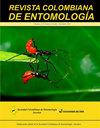Effect of herbicides on the emergence of Sitophilus zeamais (Coleoptera: Curculionidae) in transgenic Bt maize
IF 0.3
4区 农林科学
Q4 ENTOMOLOGY
引用次数: 0
Abstract
etically modified organisms (GMOs) are widespread in Brazil, especially those related to resistance to herbicides and insects. This work aimed to evaluate herbicides' effect on the emergence of maize weevil Sitophilus zeamais (Coleoptera: Curculionidae) in different maize genotypes. The experimental design was a 3 × 5 factorial experiment in a randomized complete block design with four replications. Genotypes of transgenic maize, Herculex® (TC1507) and PowerCore® (MON89034 × TC1507 × NK603) and an Isohybrid (non-transgenic) were used. The herbicides were Atrazine, Atrazine + Nicosulfuron, Ammonium Glufosinate, Nicosulfuron and a control treatment without herbicide application. The emergence of S. zeamais was observed in grains from each plot for 100 days, with 300 grams of maize grains. The Isohybrid was the most attractive to S. zeamais when no herbicide was applied. The application of Ammonium Glufosinate increased S. zeamais preference for Herculex® and Nicosulfuron for PowerCore®. The insertion of an exogenous gene and the application of herbicides in maize plants can alter components of the insect-plant interaction, changing the attractiveness to S. zeamais.除草剂对转Bt基因玉米玉米中玉米小蠊(Coleoptera:Curculonidae)出现的影响
转基因生物在巴西广泛存在,尤其是与除草剂和昆虫抗性有关的转基因生物。本研究旨在评估除草剂对不同玉米基因型玉米象甲玉米象(鞘翅目:弯甲科)发生的影响。实验设计是一个3×5析因实验,采用随机完全区组设计,四次重复。使用转基因玉米的基因型,Herculex®(TC1507)和PowerCore®(MON89034×TC1507×NK603)以及一个异杂交种(非转基因)。除草剂为阿特拉津、阿特拉津+烟嘧磺隆、草膦铵、烟嘧磺隆和未施用除草剂的对照处理。用300克玉米粒在每个小区的谷物中观察到玉米赤霉的出现达100天。在不施用除草剂的情况下,等位杂交种对玉米粉虱最具吸引力。麦草畏铵的应用增加了玉米对Herculex®的偏好,以及对PowerCore®的尼科磺隆偏好。外源基因的插入和除草剂在玉米植株中的应用可以改变昆虫与植物相互作用的成分,改变对玉米粉虱的吸引力。
本文章由计算机程序翻译,如有差异,请以英文原文为准。
求助全文
约1分钟内获得全文
求助全文
来源期刊
CiteScore
0.90
自引率
0.00%
发文量
25
审稿时长
>12 weeks
期刊介绍:
The Revista Colombiana de Entomología (Rev. Colomb. Entomol.) is the official scientific publication of the Colombian Society of Entomology - SOCOLEN since april of 1975. The journal is published twice a year. Contributions include Original Research Papers, Reviews of Entomological Topics (under a request from the Editorial Board), Taxonomic Papers, Points of View, New Records, Scientific Notes, Book Reviews, and Obituaries. The Revista Colombiana de Entomología welcomes contributions from both national and international researchers, and from members or non-members of the Society. Paper acceptance will depend on the evaluation of national and international academic peers. Manuscripts submitted for publication may be written in Spanish or English.

 求助内容:
求助内容: 应助结果提醒方式:
应助结果提醒方式:


